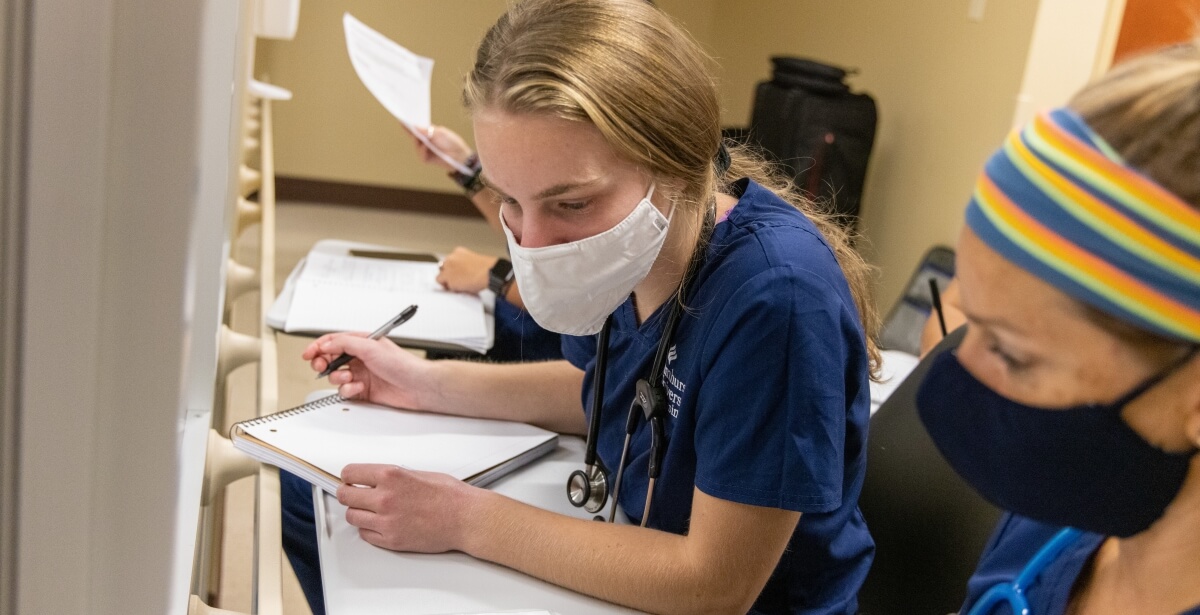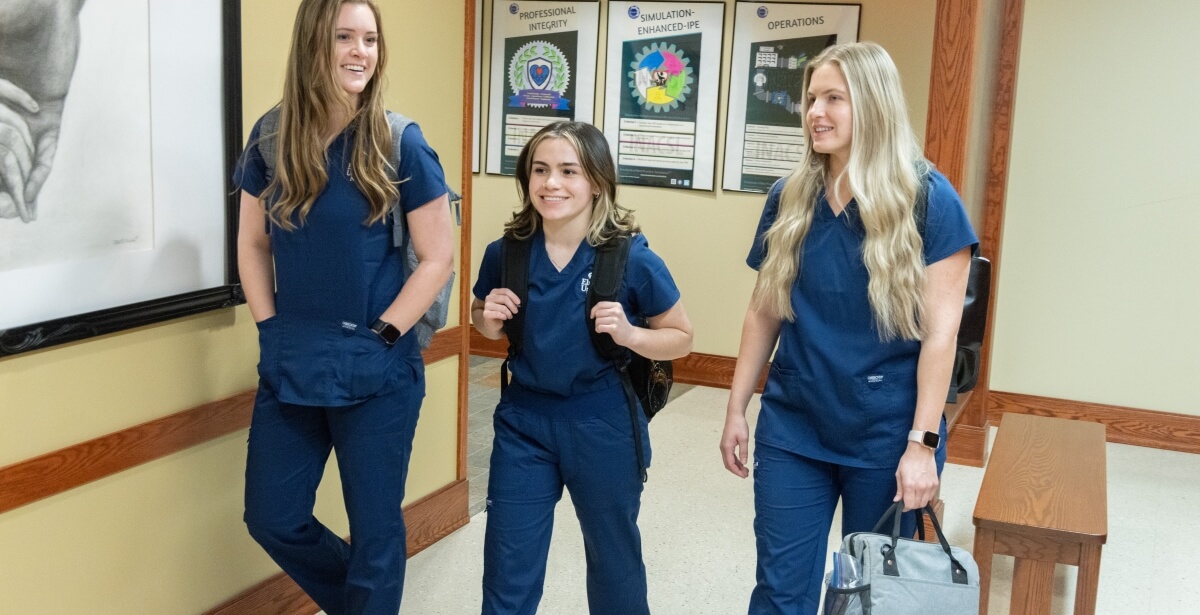Nursing School Tips: 10 Useful Study and Survival Tips for Success

You are just about ready to launch yourself into getting a nursing degree online, but you are wondering what that learning experience will be like. How do I study for nursing school when I am not attending class in person? How do I study for the NCLEX?
The truth is that no matter what type of learning environment you choose to pursue higher education in nursing, there will be challenges — as well as rewards. Nursing school and the NCLEX exam require discipline, time management and preparation.
We put together these tips for online nursing school so that you can set yourself up for success.
1. Figure out your learning style.
If you’ve never evaluated which learning style works best for you, the start of nursing school is the perfect time to find out. Every student’s brain is wired differently, and optimizing your particular way of processing and retaining information can be a game-changer.
Much has been written on the subject of different learning styles, but the basics are as follows:
Visual learners learn best by creating diagrams or seeing a demonstration of what they’re learning about. A color-coded note-taking system might be a huge boost.
Auditory learners are best taught in lecture settings or in smaller, breakout discussion groups where they can articulate ideas out loud or hear ideas expressed by others. Rewatching your online classes or creating a small study group can be a simple learning hack.
Reading/writing learners learn best by taking notes during class time and writing out flashcards to study from. Copying over your notes by hand before an exam might make studying go much more quickly.
Kinesthetic learners, also called hands-on learners, benefit from trying out real-world applications of classroom material. But even if you can’t try out what you’ve learned in class until clinicals, you might want to try walking around while you study or associating the material with physical action.
Leaning into your style of learning is a great way to jump-start your nursing school success.

2. Set priorities and goals you can realistically execute.
When you first receive your syllabi and course schedule for online nursing school, you might feel overwhelmed about all that you have to do. By carefully reviewing what you are responsible to complete, you can determine realistic timelines for your coursework and studying. You can also establish what your priorities are and set academic goals. If you have the information about which assignments are the most important or represent a high percentage of your grade, make a notation so you can prioritize that work.
Every week, build a weekly schedule based on the milestones that are coming due and incorporate any instructor/advisor check-ins and study group time to keep yourself on track. You may also want to add important personal activities to this calendar so you can enjoy your free time knowing your schoolwork is up to date.
3. Establish an efficient workspace.
A dedicated home office or study zone can create a balance between your schoolwork and the rest of your life, even if you are attending classes remotely.
Set up an area in your home where you can work with minimal distractions, and make sure it’s equipped with everything you need. It’s best if you can have a dedicated space that you don’t have to clear off for other activities—it will help you go into “study mode” when you sit down in that spot to work.
Sticky notes, highlighters, sharpies and note cards are among the must-haves nurses call out for studying for the NCLEX.
Breana Sutter, a current student in Elmhurst University’s online’s Master’s Entry in Nursing Practice (MENP) program, recommends getting a calendar that you can use to write every class and every due date on. Sutter says that you can add a study schedule to the calendar, too, so that you can effectively visualize your plan.
4. Find habits and rhythms you can stick to.
Online nursing school programs can be intensive, requiring 40 hours or more per week for classes, review and quizzes/tests. It may help your mindset to think of your schoolwork as your “job before your job”—your full-time work spent preparing for the nursing career you want. That said, implementing healthy habits and following a similar routine each day can help you manage feelings of stress and overwhelm.
Try to wake up at the same time each day, and stock your lunches with healthy foods that will fuel you through long days. See when you can fit in a workout a few times a week, even if it’s just a short routine on a fitness app that lasts five to ten minutes. When you’re headed into a stressful week, resolve to pack your bag each night before you go to bed so that your mornings are just a little bit less chaotic, and wake up at the same time each morning whenever you can.
These small decisions add up over time to a healthy lifestyle that’s conducive to successful learning.
5. Manage your time effectively.
Time management in nursing school is not always easy, but it is important. Some people react to stress with anxiety, feeling like their tasks are too big to handle. Other people procrastinate or fall prey to distractions.
One way to overcome this is to use time blocks to divide tasks into manageable chunks. Look at your weekly schedule to check for homework due dates or scheduled tests, then block your time accordingly. Instead of flitting from one task to the next, focus on one subject or activity during its designated block.
One good time management method is the Pomodoro Technique. It recommends that students study without distractions for 25 minutes with a 5-minute break before starting again. For times when you need to study with a bit more rigor, try the 45/15 rule: for every 45 minutes you spend studying, give yourself 15 minutes to let your mind wander or do something else that helps your mind relax.
Pomodoro Timer
Remember that when it comes to studying for the NCLEX (and studying for nursing school in general), it is much better to study a little bit each day than to try to cram everything into your brain at once.
Many nursing students swear by taking as many practice exams as possible, while others prefer to simply create their own study sheets using the answer keys from previous tests. This is another area where being tuned in to your learning style can help you study efficiently without wasting a lot of time.
If you’re enrolled in an accelerated nursing program like a Master’s Entry in Nursing Practice (MENP), faculty recommend stepping back from your full-time job to make room for studying.
Mia Fiore, a current online MENP student at Elmhurst, agrees. Fiore says,
“I did leave my job when I got into this program because I knew it was going to be intensive and require a lot of work. But I know it will definitely be worth it in the end.”
She says that her schedule can vary according to whether she has a big exam coming up, but that she averages four to six hours of study time per day.
6. Find your peers.
Going to nursing school online doesn’t have to mean studying in isolation. Join an online study group as soon as you can so that you can work with and get to know your peers.
Reviewing course material in a group can help you synthesize information as people share their understanding of it. You may find that one or more of you have similar questions about the material, and if an answer can’t readily be found, you can designate one of the group members to ask the instructor for guidance and report back.
Sutter says that other students in her online MENP program have been an invaluable resource. “I recommend talking with your peers, sharing study guides with each other, kind of sharing the material.” She says that even though she’s in Minnesota and they are based in other states, meeting over a video platform with her study group has been a big help.

Your instructors, too, will be willing (and sometimes, eager) to discuss the material. Your faculty will most likely provide an email address and the hours when they can be reached. Seek them out when you have questions about the material, but also when you want to understand a grade or other feedback you’ve received.
Social media can also provide a window for connection while you study for nursing school. Forums on Reddit, hashtags on Twitter and the TikTok nursing community (#NurseTok), are all ways you can find people who are experiencing the same things you are. Facebook groups specifically designed for NCLEX study tips often have crowdsourced resources that you can use to study and discuss questions you have about the test.
7. Connect with faculty.
When you’re enrolled in online nursing school, staying engaged with your instructors might require getting a bit more proactive. The good news is that your instructors want you to come to them with your questions and concerns. It makes their job easier when they can connect with you, clarify assignments and understand what’s working for their instruction.
Online classrooms typically have discussion boards where you can interact with faculty as well as the rest of your class, and those forums can be invaluable tools.

Even if you feel shy about sending that email or asking a question, err on the side of communicating more than you think you need to. It’ll make you a standout student, and you never know where the connection might lead. A solid connection that you make with a teacher online today can become a networking opportunity, a job reference or even a lasting friendship in the future.
8. Do advance prep for clinical placements.
A big part of your nursing education will come from your clinical rotations, where you will provide care for real patients under the supervision of an experienced RN. This will be the time when you utilize the knowledge you’ve gained through classes and the skills you’ve learned in labs and put them to work.
Depending on the setting in which you will be working, you can expect to perform certain nursing tasks, such as taking a patient’s vitals or starting an IV. You will work under experienced nurses in the setting and gain practical experience by learning assessment skills, care coordination, patient advocacy and much more..
Like with any new experience, you will have to adjust. If you have never interacted with patients before, you may feel nervous, and each time your rotation changes to a new setting or department, there will be something new to learn. You will have to meet and work with new clinicians and new patients, so you will have to cope with frequently changing expectations.
Read On The Importance of Clinicals
You will also have to adjust in terms of time management. While your clinical work might take place one day a week (depending on how your program is structured) you will still have coursework to attend to on the other days of the week. During clinical rotations, you’ll still need to keep pace with your studying routine.
You’ll need to be prepared with nursing-specific equipment that you’ll take with you through your nursing career. Scrubs and durable non-slip shoes are the building blocks of most nursing uniforms. Rules about face piercings, hair styling and jewelry may apply to your clinical setting, and you’ll need to get familiar with rules about how you present yourself to patients.
Here are some tips to remember before you start your assignments:
- Familiarize yourself with the setting and patient charts.
- Review the patient’s condition and any treatments or medications.
- Understand lab work and diagnostic tests and why they are being performed.
- Pack a bag/backpack with your key equipment, including (at minimum):
- stethoscope
- black pen
- notebook
- wristwatch with a second hand
- identification badge
Learn More About Our Clinical Placement Services
9. Use an NCLEX study plan.
To be licensed as a registered nurse, you must pass the NCLEX-RN exam. Preparing for this big test may be part of your school’s program, but you can also access study guides on your own.
Several publishers have NCLEX-RN study guides, but you can also go to the source. The body that issues the test, the National Council of State Boards of Nursing (NCSBN), has a free, in-depth handbook (called the Test Plan) that has an overview of all the test content categories, details about the exam, and sample questions and case scenarios.
Of course, there are a ton of other resources to help you study for the NCLEX. You can make your own study guides using Quizlet, and you can swap your study guides with other students to get extra practice.
The test is a Computer-Adaptive Test, meaning that an algorithm generates your questions based on your answers to previous questions. Exposing yourself to as many questions as possible will help you grow comfortable with the content and style of questions ahead of exam day.
10. Take good care of yourself.
All this planning and hard work will go to waste if you don’t take care of yourself. Make time for family and friends, healthy food, good sleep and exercise. You need to schedule breaks and actually rest during those breaks if you want to be successful at studying for nursing school.
It may seem counter-intuitive, but reset activities that let your brain relax can actually help you retain what you’re learning. Even online students can fall into the habit of all-nighters and study cram sessions, but these really won’t prepare you well for nursing the way that slow, steady progression sprinkled with a healthy dose of planned rest time will.
Quality of Online Programs
Some people may be concerned that an online nursing program is not as rigorous as in-person learning.
One of the most important criteria to consider is whether the program is accredited by an established organization.
The two primary accrediting bodies in the U.S. are the Commission on Collegiate Nursing Education (CCNE) and the Accreditation Commission for Education in Nursing. These accrediting bodies ensure that each program, whether offered on campus or online, meets the same rigorous standards designed to prepare graduates to become nurses.
Moreover, hands-on clinical experience is still the critical element for RN preparation, and high-quality online nursing programs incorporate some on-campus learning along with providing clinical placement support.

Consider Elmhurst University for Your Online Education
Elmhurst University offers two accelerated programs for prospective nursing students who have a bachelor’s degree in a non-nursing discipline:
The Online Accelerated Bachelor of Science in Nursing (ABSN) is the fastest route to becoming a BSN-prepared nurse and prepares students to graduate in as few as 16 months.
The Online Master’s Entry in Nursing Practice prepares students to take on the role of RN with a Master of Science in Nursing in just 20 months.
Both programs are accredited by the CCNE and have full support for securing clinical rotations near the student’s home base. They use NCLEX-RN test preparation materials throughout the program and model exam questions off of the NCLEX-RN to help students prepare.
U.S. News & World Report ranks Elmhurst University as a leading Midwest university. An immersive educational experience is delivered by a passionate, supportive community that values personal growth, human rights and social justice.
An enrollment advisor can answer your questions about getting a direct entry nursing degree online.

